Disclaimer: I received a FREE copy of this product through the HOMESCHOOL REVIEW CREW in exchange for my honest review. I was not required to write a positive review nor was I compensated in any other way.
Although I’ve wondered what Progeny Press’ literature study guides were like for several years, we had never tried one until last month. When an opportunity arose for the twins and me to review the Animal Farm Study Guide, curiosity won out, and I signed us up. George Orwell’s famous novel was intriguing, and the study guide drew us into the cultural climate in which the book was written. We learned new vocabulary, answered comprehension questions, practiced literary analysis, and even explored each chapter through the lens of Scripture.
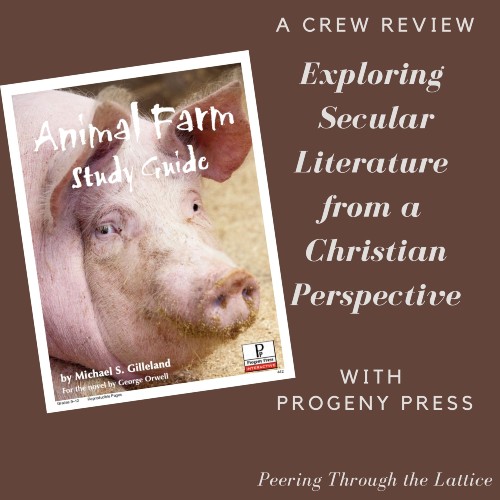
As soon as we received our digital study guide, we were anxious to get started. I was a bit surprised when the guide recommended that we read the entire novel first. Since each lesson focuses on one or two chapters of the book, I wondered why we couldn’t just read a chapter or two and then work on the corresponding pages. Despite my doubts, I asked the girls to read the entire ten-chapter book before beginning our detailed study. It was the right decision because it gave us a broad perspective of the book before we started discussing it.
Introductory Material
After the girls had read the novel on their own, I started reading them the study guide’s Introductory Material. First, a Synopsis helped them solidify their basic understanding of the novel’s plotline.
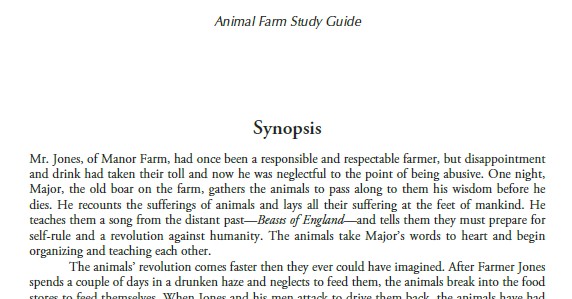
As we continued to the next page, the girls were fascinated to learn About the Novel’s Author, George Orwell.

Next, we encountered Background Information, which included summarized various Governing and Economic Systems. Some of the questions that came up later in the study guide referred back to this material.
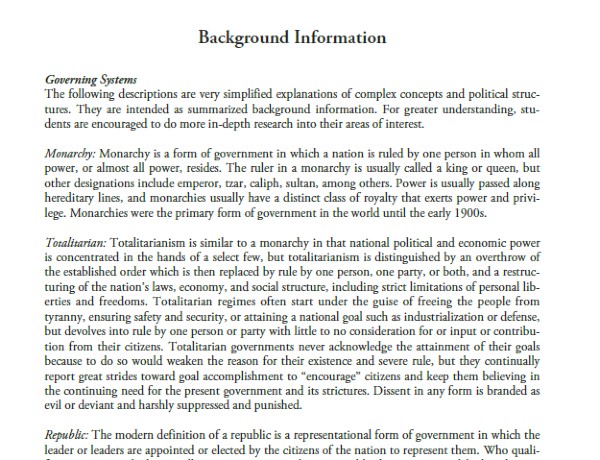
Although we did not formally complete any of the Optional Pre-reading Activities that followed, we discussed examples of allegory.
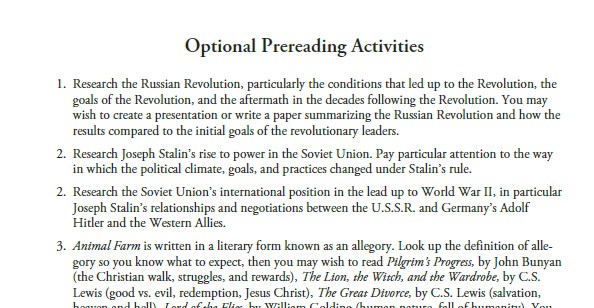
In-Depth Chapter Study
Progeny Press Study Guides are designed for students to complete independently. Our downloadable PDF could be printed out as worksheets or filled in on the computer. If my extremely independent high school senior were using one of their study guides, perhaps she would use it as designed. However, I used it as a tool for leading oral discussions with my freshman twin daughters. After the girls answered each question as thoroughly as possible, I often summed things up by reading them the response from the Answer Key. Occasionally, the Answer Key outlined points the girls failed to mention, so this was a great learning opportunity.
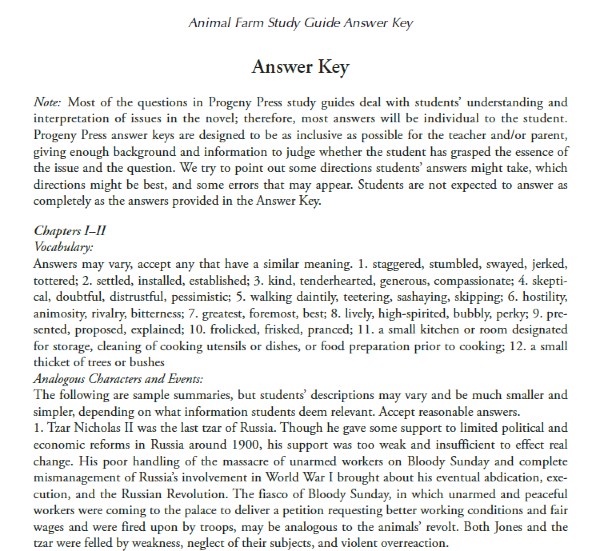
Initially, I wasn’t sure how much we should cover each day. Near the beginning of the study guide, the Note to Instructor suggests working on one page each day. By my calculations, that could take 11 weeks! We typically covered one to two pages per day, which was about one lesson each week. Each lesson consists of five sections: Vocabulary, Analogous Characters and Events, General, Analysis, and Dig Deeper. Completing at least one section each day is a reasonable goal. At this pace, it should take about eight weeks to complete the entire study guide.
Vocabulary
At the beginning of each week, we studied vocabulary words from Animal Farm. Since word study can be tedious for students, Progeny Press varies the activity from one lesson to the next. In the first lesson, students find synonyms in a thesaurus. The next lesson shows students the word in a sentence from the book and asks them to look up the appropriate dictionary definition. Others provide multiple-choice exercises or asked students to write sentences using the words. The variety of activities is sure to break up the monotony of vocabulary study for an independent learner.
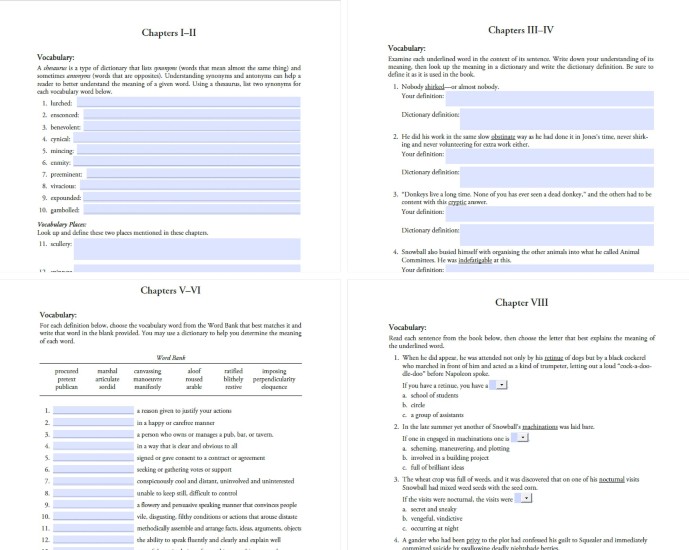
Since my daughters and I were completing the study guide orally, we focused more on the words than on the activity. After I called out a vocabulary word, they would tell me what it meant if they already knew it. If they didn’t know it, they searched their Kindle version of Animal Farm to find the word in context. One girl read the sentence containing the vocabulary word; the other tapped the screen to read the definitions from the Kindle dictionary. Together, they determined which definition best fit the context of the story.
Analogous Characters and Events
Since Animal Farm is an allegory, it is necessary to understand what the book’s animals and events represent. In each lesson, the second activity requires students to connect a historical figure from the Soviet Union with a character in the novel.
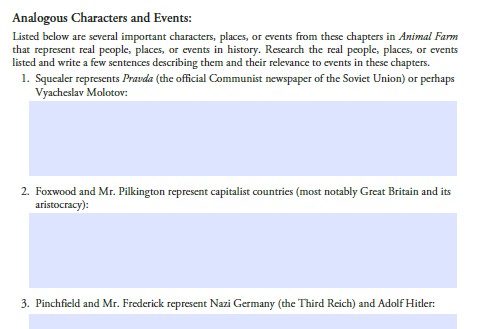
Not having studied this historical period in depth, the girls did a lot of online searching. They took turns looking up the historical figures. After reading aloud the key points from their online discoveries, they explained how the Animal Farm character represented that person. I skimmed through the answer key to be sure they touched on the main points before we moved on.
General Questions
The next section evaluated my daughters’ basic comprehension of the novel. I asked each question aloud and waited while they answered.

These questions were essential to ensure that they understood what was happening in the story. Sometimes, the questions helped them recognize the significance of details they had overlooked during their first read-through.
As we progressed through the study guide over several weeks, the twins often had trouble remembering what happened in each chapter. Although I encouraged them to re-read the chapter before our discussion time, refreshing their memory of Animal Farm was low on their priority list during summer break. Whenever they didn’t immediately know the answer, they skimmed through the chapter to see who could discover the answer first.
Analysis Questions
Since the twins have seldom analyzed literature, I was concerned they might struggle with the Analysis section. The questions introduced literary terms and explained them clearly so that my daughters could apply them. While using the study guide, the girls learned about concepts such as personification, poetic justice, juxtaposition, mood, irony, and hyperbole.

Whenever a new literary concept was introduced, it was fully defined. When mentioned again in subsequent chapters, the girls could recall the term and apply it without referring back to the original explanation. Despite my initial fears, the twins saw the Analysis section as a welcome challenge. Each set of questions helped them consider the story in a different light.
Dig Deeper
The Dig Deeper section is the hidden jewel of the Progeny Press Study Guides. Many of these critical thinking questions challenged the twins to view the novel through the lens of Scripture.
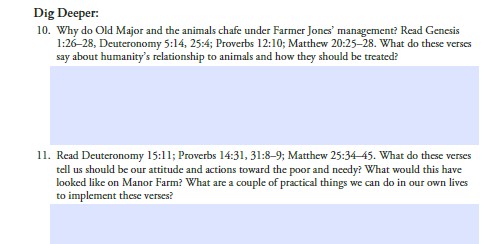
How should we treat our enemies? What qualities should Christian leaders exemplify? What does the Bible have to say about fear and anxiety?
As we explored questions like these, the girls took turns looking up verses and comparing the character’s actions to what the Bible says. After this in-depth study, they could more clearly understand how to apply Scripture to their own lives. The meaty Dig Deeper sections are the best-kept secret of the study guides.
Optional Projects and Activities
Although we skipped over anything labeled “optional” in the study guide, the Optional Projects and Activities could serve as enrichment activities. Some require a bit of research. Others challenge students to dig deeper into Scripture.
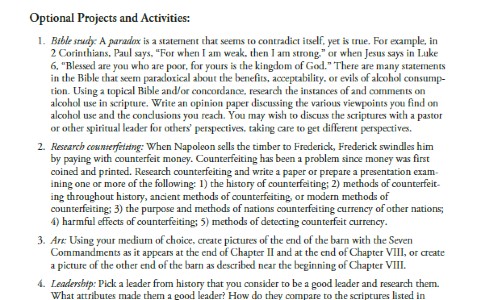
Although some conclude with a writing assignment of some sort, others allow students to express themselves artistically. For families who choose to assign them, I recommend viewing these projects as a kind of smorgasbord. Students should not be required to do all of them. Instead, they could choose one to complete every week or two.
Overview
While most lessons focus on specific chapters of the novel, the final Overview lesson help students analyze the overall plot, types of conflict, and prominent themes in Animal Farm.

At the close of the lesson, a list of seven Optional Essays and Projects provides opportunities for further research and writing. Completing even one of the essay suggestions would offer excellent preparation for college.
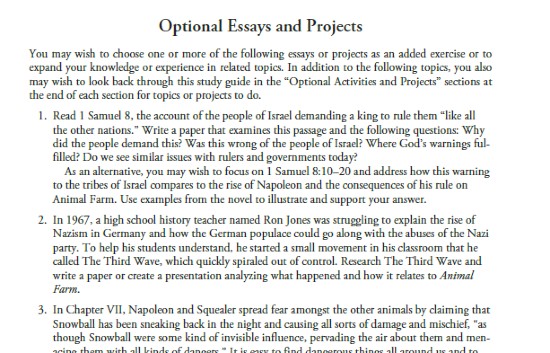
We only completed the first half of the study guide during the review period, so we have not yet reached the Overview.
Twin Opinions on the Progeny Press Study Guide
Before using this study guide, I could not imagine having in-depth discussions about literature, politics, and the Bible with my two youngest. As we worked through the guide together, the twins grew in their understanding and gained a new perspective.

The older twin notes, “The study guide sheds light on everything in the book and helps us find things like this in different contexts as well. For example, while watching Babylon 5, I’m seeing a lot of things that remind me of what the Soviets were doing.” I am amazed that our in-depth analysis of Animal Farm has enabled her to understand a sci-fi series at a much deeper level.
Her study of Animal Farm sparked a fresh fascination with history. She asserts, “It helped me learn a bit about history and things that I would never be interested in before.”
Never before had my daughter dug so deep into a literary work. In the past, most of the questions we discussed focused on comprehension. However, in the Animal Farm Study Guide, “The questions are more about the ideas in the book instead of just what the character is doing.”
Her two-minutes-younger sister appreciated the faith component of the study guide. She notes, “Seeing what is true and good is applicable to everyday life.” We were all pleasantly surprised to find such spiritual depth through the pages of the study guide.
Oral vs. Written
What if the twins had written down their answers rather than having an oral discussion? How might our study have been different? I posed these questions to my daughters before writing our review.
The older twin assured me, “If we just wrote down the answers, we wouldn’t get into as much detail as we do.” She is confident that oral discussion “helps us understand the book more fully.” Her sister was quick to add, “Sometimes we hop off on [helpful] rabbit trails this way—we talk about things that the study guide doesn’t mention, and we wouldn’t mention otherwise.”
Since the twins benefit so tremendously from discussing ideas, we were pleased that we could effortlessly tweak the study guide. I am sure that my older daughter, who usually made herself scarce while the twins discussed the book, would prefer to write out her answers.
Important Details to Consider
As we studied Animal Farm, one of the twins asked an important question, “Does the study guide give us high school credit?” The answer is yes. By completing a high-school level Progeny Press Study Guide, students can earn ¼ of a credit.
When I’ve considered using Progeny Press resources in the past, the price has always held me back. Is a digital high school study guide really worth $21.99? Having seen my twins learn so much while studying Animal Farm, I can see that it is. While including vocabulary and comprehension questions typical of a literature unit, they also incorporate in-depth literary and biblical analysis. I now more fully appreciate their study guides’ value and would love to use more of them in our homeschool.
Homeschool families on the Review Crew could select from five Progeny Press Study Guide, each geared for a different grade level range. I wonder what it would have been like to use their elementary-level A New Coat for Anna Study Guide or In the Year of the Boar and Jackie Robinson Study Guide when my kids were younger. Visit the Review Crew Blog to read how families used these and other titles from Progeny Press.